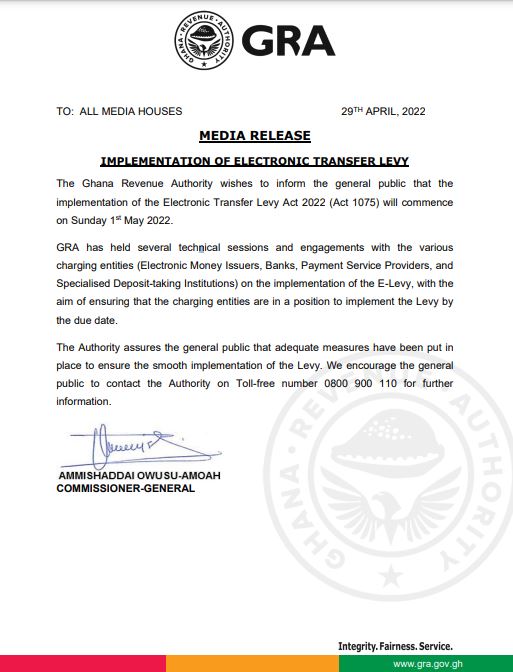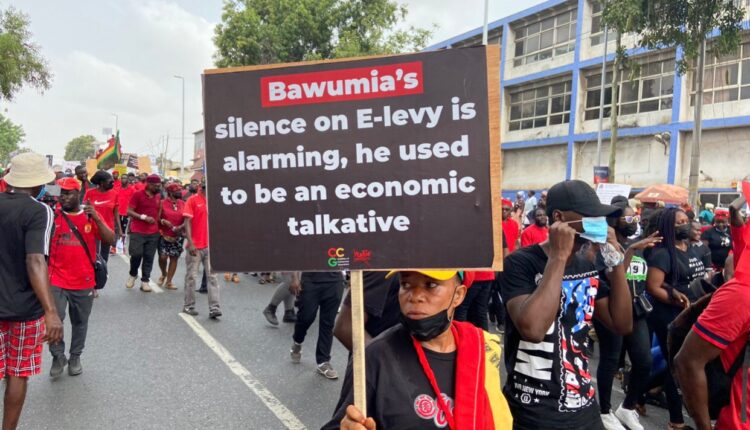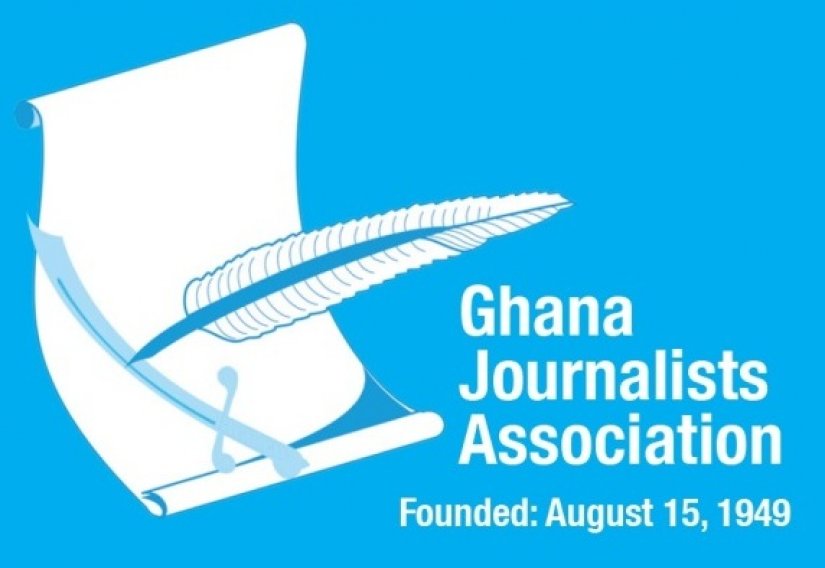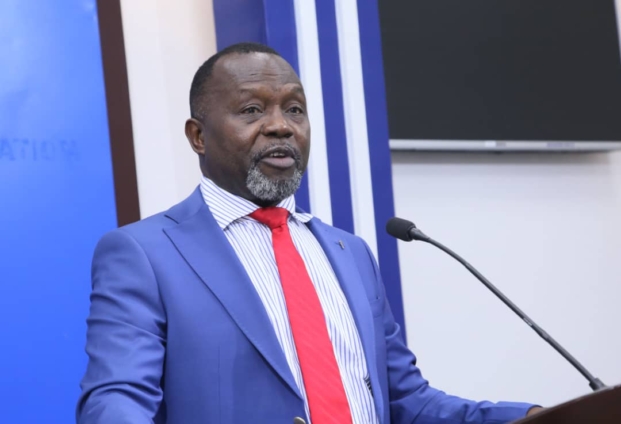Despite opposition and threats, the Ghana Revenue Authority (GRA) is implementing the new Electronic Transfer Levy (E-Levy) effective today (1 May 2022).
It implies that a 1.5% tax will be deducted from specified electronic transactions across the country.
The charges will be on Mobile Money (MoMo) payments, bank transfers, merchant payments, and inward remittances at the time of transfer.
A few days before the implementation, banks, telcos and various electronic payment platforms sent messages to notify their clients about the new regime that would affect client funds.
In a message to customers on Friday, April 29, Fidelity Bank said: “Dear valued customer, effective May 1, 2022, E-Levy will apply to instant electronic transactions.”
OmniBSIC also said: “Dear valued customer, please be informed that effective May 1, 2022, the E-Levy will be charged on electronic transfers.”
The GRA had earlier assured the public about adequate preparations for smooth implementation.
“The Authority assures the general public that adequate measures have been put in place to ensure the smooth implementation of the Levy,” it said in a statement released on 29 April 2022.

“GRA has held several technical sessions and engagements with the various charging entities (Electronic Money Issuers, Banks, Payment Service Providers, and Specialised Deposit-taking Institutions) on the implementation of the E-Levy, with the aim of ensuring that the charging entities are in a position to implement the Levy by the due date,” it added.
The authority also explained that the implementation would take place in various phases.
“Following Ghana Revenue Authority’s assessment of the general readiness of some Charging Entities to integrate with the E-levy Management System, the Commissioner-General has decided on a modified phased approach for the implementation of the Levy from 1st of May 2022.”
If everything goes to plan, the government expects to generate GH¢4.5 billion from the tax in line with developments following the proposal tabled in November 2021.
In the 2022 Budget statement, the government said it aimed to collect GH¢6.9 billion from the levy from an initial tax rate of 1.75%.
However, after it was reviewed and slashed to 1.5%, the expectations have also been adjusted downwards.
Not all Ghanaians are enthused about the levy, with the #FixTheCountry Movement threatening to sue the GRA if it proceeded with introducing the tax.
In a statement, the social media activist group reiterated that any attempt by the authority to enforce the new levy on May 1 would amount to contempt of court due to an injunction filed by some MPs.
The injunction filed on Tuesday, 19 April 2022, by three NDC legislators against the levy is still pending at the Supreme Court.

In their application, Minority Leader Haruna Iddrisu, Bawku Central MP Mahama Ayariga and North Tongu MP Samuel Okudzeto Ablakwa urged the apex court to restrain the Ghana Revenue Authority (GRA) from implementing the new tax.
They argued that millions of people would suffer irreparable harm if the E-Levy Act was not put on hold, and the court determined that its passage was unconstitutional.
According to them, the GRA would be unable to reimburse the millions who would have paid the E-levy, while the 1992 Constitution, which is the supreme law of the land, would have been undermined.
“That the Plaintiffs having raised an allegation of a breach of the Constitution in the passage of the Electronic Transfer Levy Act, 2022(Act 1075), in order to avoid an incalculable damage, injury and inconvenience not only to the people of Ghana but as well as undermining the Constitution which is the supreme law of the land, the justice of the case demands that the implementation of the Electronic Transfer Levy Act, 2022(Act 1075) is put on hold until the final determination of the instant suit,” the injunction application stated.
In their substantive suit, the three MPs expressed their desire for the apex court to declare the passage of the E-Levy as unconstitutional and, therefore, null and void.
It is their case that Parliament did not have the right quorum to pass the E-Levy as stipulated under Article 104(1) of the 1992 Constitution, which the Supreme Court had recently interpreted.
According to them, at the time the second reading for the passage of the E-Levy was done, there were only 136 MPs present in Parliament instead of the required 138.
Therefore, they want the court to declare the whole proceedings, including the second reading, third reading, and voting to pass the E-Levy, as unconstitutional and of no effect.
They had filed an earlier application against the E-Levy on 30 March 2022.

The General Secretary of the NDC, Johnson Aseidu Nketia, explained the importance of tax to national development and described the E-levy as counterproductive.
“If in the unlikely event, the E-levy is passed, we will abolish it in our next government because we do not see it as a tax. It is daylight robbery,” he stressed. “That is not to say that we will not be taking other taxes, but we are saying that this is not a tax based on any value addition or production; it is thievery, it is daylight robbery”.
However, on Tuesday, March 29, Parliament approved the policy without the participation of NDC MPs who had staged a walkout during the E-levy debate.
What is the E-levy?
The E-levy is a tax applied on transactions made on electronic or digital platforms. The Minister of Finance announced in Parliament the intention to implement the bill during the presentation of the 2022 Budget.
The tax is one of the measures government plans to use to increase the country’s tax to GDP ratio from 12 5% in 2021 to 20% by 2024.
The government said it would use the revenue for entrepreneurship, youth employment, digital infrastructure and cyber security, and provision of road infrastructure.
The E Levy is charged at the rate of 1 50% on the following transactions:
•Mobile Money transfers done between accounts on the same electronic money issuer
•Mobile Money transfers from an account on one electronic money issuer to a recipient on another electronic money issuer
•Transfers from bank accounts to mobile money accounts
•Transfers from mobile money accounts to bank accounts
•Bank transfers on an instant pay digital platform or application originating from a bank account belonging to an individual subject to a threshold to be determined by the Minister of Finance.
However, not all transfers will be affected by the E Levy.
The Levy does not apply to the following types of transfers:
• A cumulative transfer of One Hundred Ghana Cedis a day made by the same person
•A transfer between accounts owned by the same person
•A transfer for payment of taxes, fees and charges on the Ghana.Gov System or any other Government of Ghana designated payment system
•Specified merchant payments
•Transfers between principal, agent and master agent accounts and
•Electronic clearing of cheques
The Charging Entities are:
- Electronic Money Issuers
- Payment Service Providers
- Banks
- Specialised Deposit-Taking Institutions
- Other Financial Institutions prescribed by Regulations made under the Act.
The levy had divided Parliament, with the Majority pushing for approval while the Minority kicked against it.
There was a split vote of 12 for each side at parliament’s finance committee until the chairman cast the decisive vote favouring the proposal.
Parliament degenerated into fisticuffs at a meeting to approve the levy prompting an adjournment to 18 January 2022.
The Chamber turned chaotic as MPs pushed, shoved and punched each other during the heated exchanges that many observers have since condemned.
This was after the Speaker of Parliament, Alban Bagbin, had left and delegated the First Deputy Speaker, Joe Osei Owusu, to take over proceedings.
The Minority had said it would do all it could to ensure that the bill did not see the light of day, insisting it was not in the best interest of Ghanaians.
Discussions on the proposed levy
Since the announcement by the minister in parliament last year, the tax has faced strong rejection, with tax experts describing it as harsh, considering the economic situation in the country, but the government insisted it would pass it.
The Ghana National Chamber of Commerce and Industry (GNCCI) called on the government to reconsider imposing a 1.75% levy on mobile money and other electronic transactions in the country.
The Chamber maintained that the proposed levy would further worsen the plight of businesses, particularly small and medium enterprises (SMEs), which were mainly growth-driven and susceptible to economic and market cycles.
GNCCI said to increase revenue, the government should rather focus on finding innovative ways of widening the tax net, ensuring tax compliance, as well as addressing the rising levels of tax exemptions which did not commensurate with business growth.
Additionally, investment banking firm C-nergy Ghana Limited joined the chorus in admonishing the government to review the proposed Electronic Transaction Levy.
Even though C-nergy was not entirely opposed to the levy, they believed that “the 1.75% E-Transactions levy rate is high”.
Analysts from the firm said the scope and coverage of the levy were wide enough to generate the targeted revenues “if it is monitored and managed effectively”.
For Speaker of Parliament Alban Bagbin, the approval of the E-levy will spell doom for the governing NPP in the 2024 elections.
“It is very clear that if this your E-Levy goes through, you (NPP) have lost the election,” he said during a speech at a meeting with former legislators on Thursday, 23 December 2021.
















